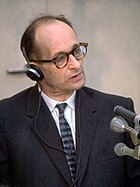
During his notorious trial in Jerusalem in 1961, Adolf Eichmann described himself as a sort of Kantian. But, he also said, Kant's thinking was too deep for him so he had devised a whittled-down Kantianism suitable for his mind, and THAT involved taking the Fuhrer's Word to be an expression of Duty.
This explanation had no impact on the outcome of the trial. Eichmann was executed, and he would presumably also have been executed had he declared himself a utilitarian or anything else ending with "ian" or "ist" or the like. Or if he had never sought to wax philosophical at all.
But it did have three consequences that interest me at the moment:
1) it helped persuaded Hannah Arendt that Eichmann's mind was "banal,"
2) it was taken by some (Leonard Peikoff) as proof of the badness of Kantian ethics,
3) It has stimulated research into what if anything Eichmann can be found to have said about deep philosophical subjects when he WASN'T on trial for his life.
Document disclosures and research since then, some of it under the third of those heads, has undermined the conclusions drawn under the first and second.
Eichmann was quite confident, living in Argentina, that he had made a clean getaway. He had a circle of associates who like himself were unrepentant former Third Reich officials (though none had been so high-ranking as himself) and he talked freely among them.
What we now know is that Eichmann, when he wasn't on trial for his life, was not a Kantian at all. He rejected Kant as a German who wasn't truly German. It was the universality of Kantian ethics that irked him -- it could on its terms apply to everyone, thus it treated everyone as an equal, thus it was misguided dreck.
Further, the research since that trial undercuts the idea that Eichmann was "banal." He seems to have been a reasonably bright individual (not on Heidegger's level philosophically of course, or on Arendt's, but still ...) who consciously adopted an evil perspective on life that enabled his eventual notoriety.
Some have said (and I think this right) that Arendt's formula wasn't wrong, it was simply applied wrongly. Banality had a lot to do with the success of Nazism, for so long as it was successful. The empty headed "just follow orders" mindset she latched on to in her coverage of his trial was very real, but Eichmann wasn't a good example of it. The Kantian and the mindless conformist were two of the masks he put on due to the drive to survive.
A few days ago I put forward here my own view that the disastrous philosophical influence was not Kant, but Hegel. Of course, one can say "without Kant, no Hegel," but one could as easily say without Rousseau, no Kant. Without Pufendorf no Rousseau. So blame it all on Pufendorf, or else just go back and so on back and back, to Thales. The distortions in the human spirit that we associate with modern totalitarianism are distinctly traceable to Hegel, and at odds with (among much else) the keynote of epistemological modesty in Kant.
Comments
Post a Comment